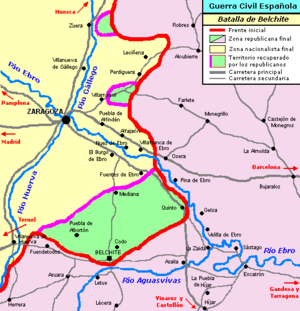Our website is made possible by displaying online advertisements to our visitors.
Please consider supporting us by disabling your ad blocker.
Battle of Belchite (1937)
This article needs additional citations for verification. (September 2014) |
| Battle of Belchite | |||||||
|---|---|---|---|---|---|---|---|
| Part of the Spanish Civil War | |||||||
 Progress of the Battle of Belchite with initial and final situations shown. | |||||||
| |||||||
| Belligerents | |||||||
|
|
| ||||||
| Commanders and leaders | |||||||
|
Colonel Vicente Rojo Lluch General Sebastián Pozas General Antonio Cordón General Walter General Kléber Commander Enrique Líster |
General Miguel Ponte Lieutenant Colonel San Martín † Commander Santa Pau † Major Alfonso Trallero † | ||||||
| Strength | |||||||
|
80,000 infantry 105 tanks 200 aircraft (for the whole Offensive of Zaragoza) 8-25,000 infantry, 40 tanks, 80 aircraft to conquer the town of Belchite | 70,000 infantry, (5,000 in the town of Belchite, including civilians) 100 aircraft, 100 artillery | ||||||
| Casualties and losses | |||||||
|
2,800 killed 6,000 wounded (in the town of Belchite) |
2,000 killed 600 wounded 2,411 taken prisoner, including civilians (in the town of Belchite) | ||||||
The Battle of Belchite refers to a series of military operations that took place between 24 August and 7 September 1937, in and around the town of Belchite (almost 4,000 inhabitants in 1936, decreasing to around 2,600 during the battle, from the repression and displacement of the first year), in Aragon during the Spanish Civil War, as part of a much bigger offensive to take Zaragoza, that continued until beginning of November 1937. Since the Offensive of Zaragoza failed, for propaganda reasons, the Republicans started calling it Battle of Belchite instead, so it looked like a victory, the journalists that came to report the victory, including Ernest Hemingway, contributed to this change of names. The Nationalists continued the confusion, since they exploited the "Numantine" defense of the town for propaganda too, to counteract the bad image of the bombing of Guernica.
Previous Page Next Page


